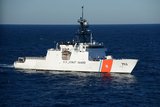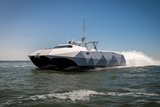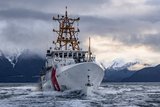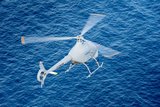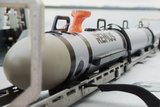UK’s Royal Navy trials autonomous mine hunting capability
The Apollo mine counter measures vessel was launched into the Firth of Clyde. (Photo: UK MoD)
The UK’s Royal Navy (RN) has tested an uncrewed small boat, the Apollo, as an autonomous minesweeping and countermeasures option, to avoid putting human sailors at risk.
The Apollo maritime mine counter measure (MMCM) vessel was designed to be deployed from a larger ship and operated as an autonomous mine hunting tool for the navies of the UK and France. The agreement will be managed by the Organisation for Joint Armament Co-operation (OCCAR), a European intergovernmental organisation that represents Belgium, France, Germany, Italy, Spain and the UK.
The Apollo was deployed in the Firth of Clyde in Scotland, which has both significant water depth and coastal currents to challenge any vessel. It was launched from Defence Marine Services’ ship SD Northern River.
Related Articles
Royal Navy sails autonomous RIB in UK waters for the first time
The Apollo, manufactured by L3 Harris under a contract with Thales (France), was delivered to the UK as a concept demonstrator in 2021. Following its Scottish trial, the vessel has been returned to Thales for retrofit and upgrades ahead of being transferred back to the Royal Navy in 12 months’ time.
Commander Daniel Herridge, commanding officer of the RN’s Mine & Threat Exploration Group, said the trial was “another step in the paradigm shift of delivering mine counter measures capability in a completely new way”.
Andy Lapsley, mine hunting capability (MHC) team leader at Defence Equipment & Support, part of the UK Ministry of Defence, added: “This trial successfully demonstrated the potential for the maritime mine counter measures capability to be deployed flexibly and at pace for the Royal Navy, demonstrating our commitment to advancing mine counter measures technology and commercial platform integration.”
The trial follows hard on the heels of the RN’s first trial in UK waters of a remotely controlled and autonomous rigid hull boat, the Autonomous Pacific 24. The results of that trial found that the uncrewed vessel could go faster in rougher sea states than a crewed vessel, opening up opportunities for the use of autonomous vessels in scenarios of significant threat.
More from Naval Warfare
-
![UK and France signal shift to autonomous helicopters to boost naval power]()
UK and France signal shift to autonomous helicopters to boost naval power
Recent developments in France and the UK highlight how autonomous helicopters are becoming central to naval force design as navies seek to integrate crewed and uncrewed systems at sea.
-
![US Coast Guard’s small response boat demonstrators to be delivered in three months]()
US Coast Guard’s small response boat demonstrators to be delivered in three months
The platforms will be tested in multiple missions to define performance requirements for a coming acquisition programme.
-
![What HII’s UK expansion could mean for Royal Navy’s uncrewed future]()
What HII’s UK expansion could mean for Royal Navy’s uncrewed future
As HII prepares to deliver its latest AI-enabled uncrewed surface vessel later this year, its major UK facility expansion aligns with the UK Royal Navy’s plans for a hybrid fleet.







